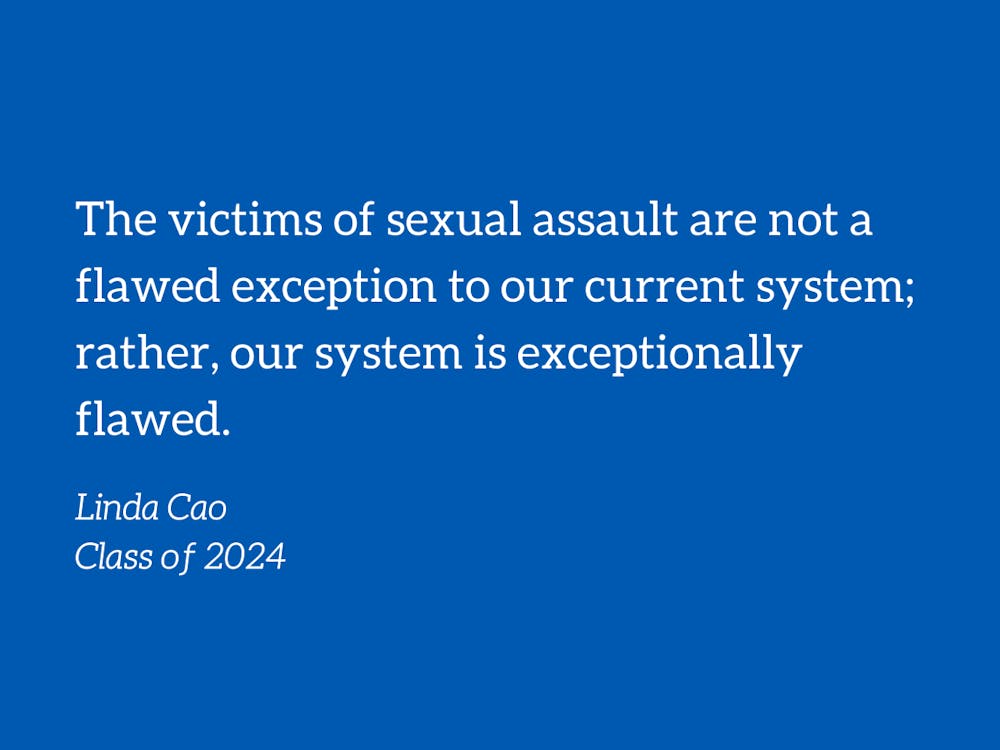Editor's Note: This column discusses sexual assault. Reader discretion is advised.
Growing up, I was told that the world is a cruel place. Yet, what sounds like elderly wisdom is sometimes exploited to negate and justify horrendous acts—glossed over in one broad stroke of “life is unfair.” As seen in her inspirational publication Know My Name, Channel Miller’s assault was no exception. Consequently, it is from her courageous journey that I realized that the world is not a cruel place, but rather sometimes we are just cruel people.
Perhaps, ironically, it’s a bit cruel to make such rash generalizations. After all, there are individuals who uphold honor and integrity in our society. Prime examples: Peter Jonsson and Carl-Fredrik Arndt—the Swedes. Despite confirming their testimonies, there were multiple comments doubting the Swedes’ credibility—were they genuine eyewitnesses? Not only was I in utter disbelief, but I could not digest the incredulous disappointment that we live in a world where the decision to intervene is so uncommon that it has become something unbelievable. Indeed, the Swedes were in a position where they could disregard everything that night; they could turn around and pretend it never happened. And yet, they didn’t. That is integrity, as rare as it may be. It is the conscious decision to be a decent human being, even when you don’t have to be. In this case, they were more than just decent; they were heroes who sought justice.
However, my accusation of cruelty holds true in light of those who fail to empathize in difficult situations, such as the anonymous community that considers Miller responsible for her assault. But why is empathy difficult? According to the just-world hypothesis, people have the tendency to believe that the world is fair to those who abide by the rules set by society. We are inclined to perpetuate this idea because it establishes a sense of safety—the false hope that if we stay tucked under the covers, the monsters won’t hurt us. But they do. The monsters don’t care about how you dress, how you act or how you plead. The victims of sexual assault are not a flawed exception to our current system; rather, our system is exceptionally flawed. To be empathetic in difficult situations, such as Miller’s, is more than being kind. It is the decision to reject this internalized tendency of victim-blaming and acknowledge the relentless truth that, indeed, the world can be a cruel place that inflicts pain onto undeserving individuals. To follow in the steps of Rosemarie Aquilina, the judge who ruled Larry Nassar guilty, extend a hand, extend an ear, and extend the time for victims to be heard.
Whenever a sexual assault victim steps forward, there are always accusations of how “suddenly” these survivors decided to share their stories. I find the word “suddenly” to be preposterous knowing that centuries of sexual harassment have been swept under a gigantic carpet of ignorance. There is no scheme for revenge, no desperation for popularity, no intention to capitalize. As Miller says herself, “We fight because we pray we’ll be the last ones to feel this kind of pain.” It’s a matter of honor—to shed light upon such crimes with the hope that more survivors will come forward. And they will. Whether it’s through an Instagram post or a 7,137-word court statement, they will come forward, compelled to do so on their own sense of honor. Despite the terror-stricken, palm-sweaty sleepless nights or the rational irrational outbursts of agonizing emotional trauma, victims will always choose to step forward to speak up for the countless others who have been disregarded, silenced, dehumanized, mocked, abused. Some may come forward to speak up for themselves. And that too is valid.
People like Channel Miller, Peter Jonsson, Carl-Fredrik Arndt, Rosemarie Aquilina and thousands of other beautiful souls are the standing, breathing evidence disproving that cruelty, although prevalent, is not universal. Ultimately, cruelty, honor, integrity, honesty, and empathy are not genetically engineered into our DNA; it is a conscious choice—eyes wide open—to be humane and supporting. Thus, if a multitude of individuals can choose to be honorable and empathetic in difficult times, then maybe, just maybe, the world isn’t so cruel after all.
This essay, written by Linda Cao, was a winner of the Duke Honor Council's essay contest for the Class of 2024 in response to the question "How does 'Know My Name' exemplify honor and integrity, ie. in regard to the importance of honesty and empathy in difficult situations?"
Get The Chronicle straight to your inbox
Signup for our weekly newsletter. Cancel at any time.
Linda Cao is a Trinity senior and an opinion managing editor of The Chronicle's 119th volume.

